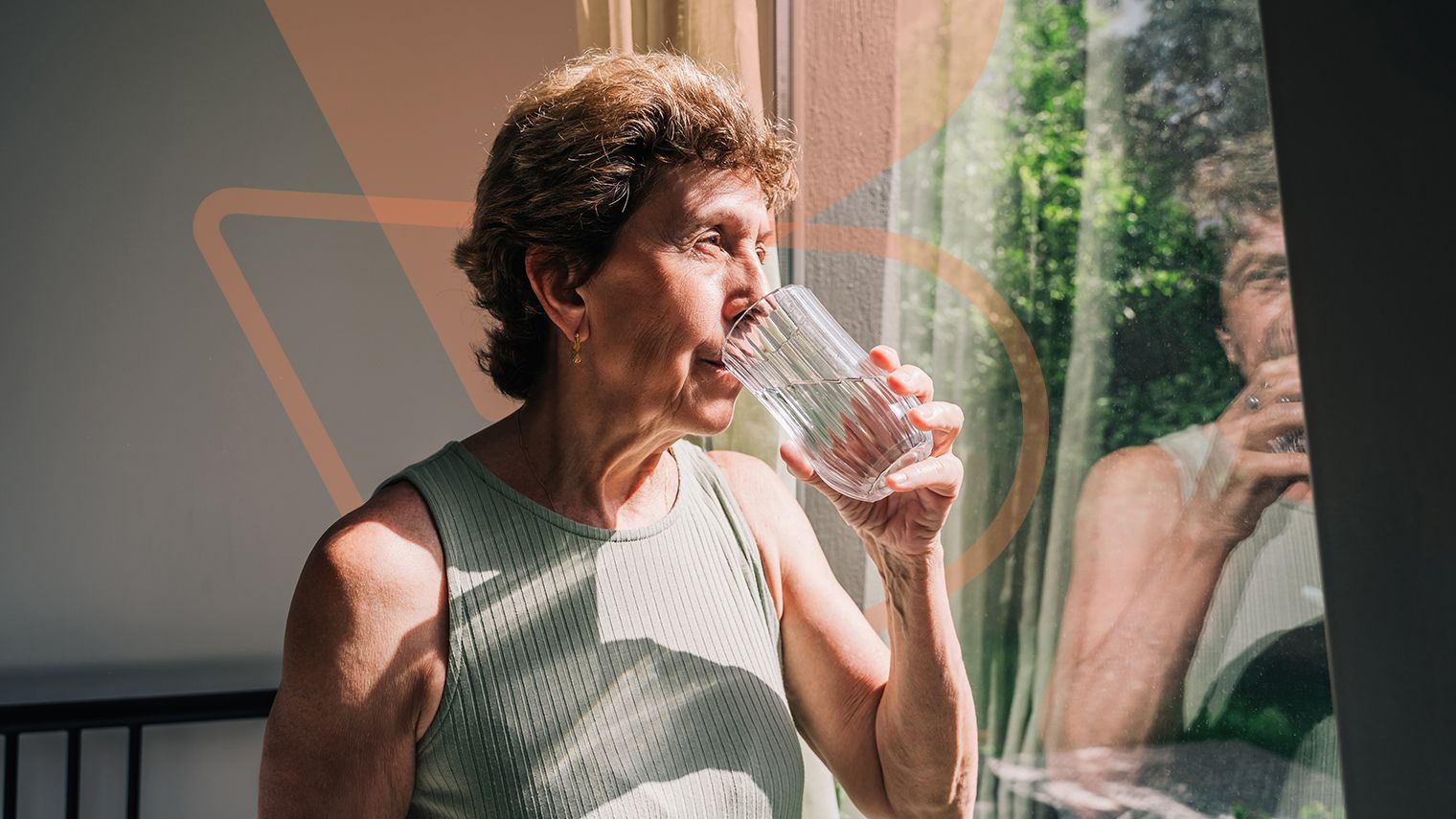Here’s Why and How to Stay Hydrated with COPD
July 26, 2024
Content created for the Bezzy community and sponsored by our partners. Learn More

Photography by Tatiana Maksimova/Getty Images
Hydration is vital for everyone, especially if you have COPD. Discover useful tips to keep you well-hydrated.
If you’ve ever gone hours without a sip of water, you know how urgent it feels to quench your thirst. Water is especially important if you have chronic obstructive pulmonary disease (COPD).
With COPD, your lungs produce excess mucus. This mucus is thick and sticky, making it harder for you to breathe. Drinking water helps thin the mucus, so it becomes easier to cough up, and you can breathe more comfortably.


How does dehydration affect COPD?
Dehydration can be dangerous if you have COPD. When you’re dehydrated, your mucus (phlegm) thickens and is harder to bring up. If phlegm remains in the lungs, you may be more likely to get a respiratory infection. You’ll also have a harder time breathing.
If you’re on oxygen, your nose may feel dry and irritated. Drinking water can help moisten your airway to make you more comfortable.
Wondering if you might be dehydrated? The CDC lists these signs to look out for:
- dry mouth
- confusion
- mood changes
- constipation
- dark urine
How can I stay hydrated safely?
A good goal for most people is drinking 6 to 8 glasses of water daily (48 to 64 ounces). If you live in a hot climate, you may need to drink more fluid as your body sweats. This goal is for people with normally functioning hearts and kidneys.
If you have congestive heart failure (CHF) or kidney disease, your body holds onto extra fluid. In this case, your doctor may recommend that you drink less than the daily recommended amount.
Ask your doctor how much fluid your body can handle if you have either of these conditions.
What are the most hydrating foods and beverages?
Plain water is better for your body than a sugary drink, such as a soda or sports drink. Water keeps you well-hydrated and has no added calories. Noncaffeinated beverages like milk and juice also count toward your daily fluid intake.
Certain hydrating foods, like soup broth, yogurt, and popsicles, also count. Fruits and vegetables with a high water content, such as watermelon, strawberries, and cucumbers, can also help supplement your water intake.
8 tips to drink more water
Meeting your daily recommended water goals might feel challenging with COPD. These practical tips can help:
1. Use a refillable water bottle
Keep a refillable water bottle with you throughout the day to remind yourself to drink from it. The removable top makes it easier to refill than plastic disposable bottles. They’re convenient and better for your wallet and the planet.
2. Use a water pitcher to track your daily progress
If you’re a visual person, you may find it helpful to fill up a water pitcher in the morning that you’ll use for the rest of the day. Use the pitcher to fill your drinking glass and track how many times you’ve refilled it. Keep a notepad handy to jot down the number of refills.
3. Spread your fluid intake throughout the day
Don’t try to drink 6 to 8 glasses of water all at once. It’s best to spread out your fluid intake throughout the day. This approach helps you stay consistently hydrated.
4. Try taking small, frequent sips
If your stomach gets full quickly, try taking small, frequent sips. This tip will give your stomach time to empty and put less pressure on your diaphragm.
5. Purchase a motivational water bottle
My personal favorite is a motivational water bottle. I purchased mine online and found it to be the easiest way to track my water intake. The time inscriptions on the side of the bottle help track progress from morning to night. These markings are an easy way to see if I’m behind at any given point in the day.
6. Limit alcohol and caffeinated drinks
Caffeinated drinks — like coffee and tea — and alcohol do not count toward your daily fluid intake. They actually go against it. They increase the amount you urinate, which can lead to dehydration. Drink alcohol and caffeinated beverages in moderation.
7. Set a timer
Setting a timer may help you remember when to take a sip. You can set it for every hour or any interval that works best for you.
A suggestion that I like to offer is to drink water during commercial breaks if you’re watching television. The commercials quickly become associated with the task you want to accomplish, making it easier to remember to keep drinking.
8. Try water substitutes
Some people don’t like the taste of water, and that’s OK. You can still find clever ways to stay hydrated. If you don’t like the taste of water, try these alternatives instead:
- sparkling water
- flavored water enhancers
- coconut water
- water infused with fruits, cucumber, or herbs
- water with a lemon wedge
Takeaway
Adequate hydration is essential for your body to function properly. Avoiding dehydration can help prevent complications from COPD. Find the strategies that work best for you to achieve your water-drinking goals.
Medically reviewed on July 26, 2024
2 Sources


Like the story? React, bookmark, or share below:
Have thoughts or suggestions about this article? Email us at article-feedback@bezzy.com.
About the author